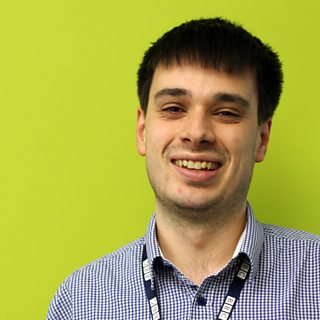±«Óãtv R&D is currently accepting applications for next year's and . We're looking for the brightest and most creative of candidates to join us, but there's less than a month left to apply! To show what life is like here for trainees and graduates we asked three who joined us in 2016 to tell us what they've been working on and what they've achieved since then...
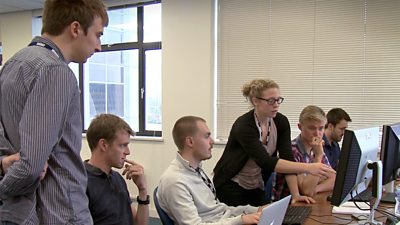
Jonathan Heathcote
After completing his BSc and PhD in , Jonathan applied to the R&D Graduate Scheme in order to get involved in the many exciting projects going on in R&D. Despite having no experience with broadcasting or the media, he was excited to learn about this challenging and fascinating field.
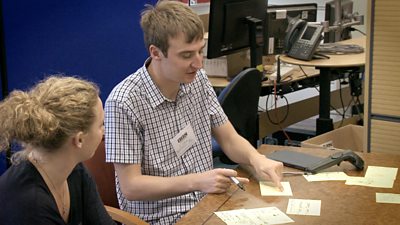
I'll admit, when I applied to ±«Óãtv R&D I didn't expect to find myself building a TV station from scratch in the space of a few hours. Much less did I expect to be interviewed as part of a local news bulletin just seconds after the satellite link finally sputtered to life. Well, OK, though the ±«Óãtv News presenter, cameras, equipment and miles of cables were all real, this was just an exercise and our hastily assembled TV station only broadcast as far as the next building. One of the absolute highlights of my first few months was the seven weeks spent training. My fears of being held back by not knowing the first thing about broadcasting were blown away. The training was split between hands-on practical exercises and tuition by ±«Óãtv technology veterans and BAFTA-winning programme makers. During this short period I, along with the other R&D graduates starting my year, learnt about everything from electrical signalling to camerawork. It was as fun as it was interesting as well as a great opportunity to get to know the other graduates and people from around the wider ±«Óãtv.
I spent my first placement in the section in R&D's London lab exploring ±«Óãtv data and companion screen technology. Did you know, if someone in the background of a TV drama so much as whistles a tune this gets recorded and logged? Neither did I, but this is just one example of some of the rich data the ±«Óãtv produces about every programme it airs. My project built on technology developed by R&D that allows mobile devices to establish with TVs and bring this ±«Óãtv data to life. Working with ±«Óãtv Radio & Music, and a number of TV programme makers, the app I developed can tell you all about the music in the TV programme, exactly when its played. As well as the numerous technical challenges involved in the project, it was a fantastic to learn about user experience (UX) design.
I'm now part way through my second placement, this time in my permanent base of the Salford R&D lab working with the team. The IP Studio project is exploring ways that more flexible IP-based networks can be used and . I've been building a research tool which makes it possible to use the experimental to build custom analysis and processing tools for multi-gigabit streams of broadcast-quality video and audio in real time. This project has been packed full with fascinating technical challenges and builds on the topics I first learned about in the introductory training.
After Jonathan's second placement, he'll undertake one more eight-month placement elsewhere in R&D and then a final three month 'mini placement' elsewhere in the wider ±«Óãtv before completing the scheme and joining a team in R&D more permanently. Outside of his placement projects Jonathan has also been involved with numerous smaller side projects. Recently he, along with another of our graduates, built to illustrate how liquid water once formed Mars' landscape.
We're looking for the brightest and most creative candidates for 2018's and
Once you've read this post, if you're interested you have until January 7th 2018 to apply and come join us!
Juliette Carter
Juliette joined ±«Óãtv R&D in 2016 as part of the graduate scheme, after completing an . The scheme seemed a great way for her to work on fun and exciting technical problems while satisfying her interest in media.
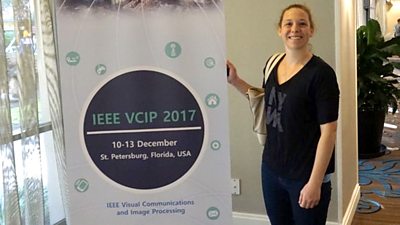
In the first project of the graduate scheme, I worked with the video compression team on developing parts of for . This taught me everything I know about video compression. Some of the highlights of being part of this team included helping out showcasing , as well as writing a conference paper on some of the research I undertook that I will be presenting at a conference in Florida! This really shows that you get to work on state of the art problems that are of interest to the ±«Óãtv and beyond!
I also wrote a web app to assess the performance of video coders, which helped me strengthen my skills in programming languages, such as C++ and javascript.
I am now undertaking my second placement of the graduate scheme which is to tackle the problem of audio source separation using machine learning, for classical music. This project has been a great way of getting to grips with machine learning, a skill that is becoming more and more desirable, and combining it with my keen interest in audio. I’ve been collaborating with as well as talking to the ±«Óãtv Philharmonic about my project. I might even get to do some recordings, to test my algorithms!
After completing her current placement, Juliette is hoping to join the team for the third project of the graduate scheme, to gain work on , a method of representing media as a collection of individual assets that can be put together in different ways to create a more personalised experience for the user.
Thomas Preece
Thomas completed his and wanted to combine his analytical skills gained from his degree with his love and passion for technology and so he decided ±«Óãtv R&D’s Graduate scheme was the perfect place to do this despite not having any skills in broadcasting.
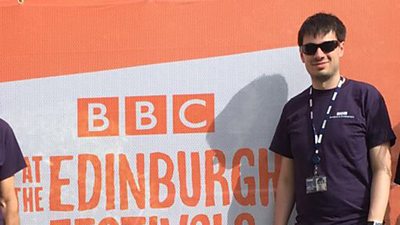
In my first project I worked with our on audio segmentation, the process of splitting audio up into different categories such as music, speech, noise and speech over music as well as looking at integrating my work to improve the performance of an in house . I’d had no prior experience in audio analysis or machine learning before so the project was a great way to get to grips in these areas as well as learning several different programing languages. I was constantly learning and I never felt in at the deep end as my colleagues were really helpful in taking time out to explain concepts in detail if I ever got stuck.
My second project was with our , working on using methods to extract interesting metadata from video content. The project brief was very wide so it was amazing to be given the freedom to direct the project and learn the important ability of figuring out when you are going down a dead end and readjust course. In the end I managed to produce a real-time architecture for detecting and tracking objects through ±«Óãtv content, integrated that into IP Studio and created a plugin for enabling real-time rendering into IP Studio. This wide assortment of things fit together to create an Artificial Reality pipeline for IP Studio and gave me experience in some really interesting areas such as deep learning, Unreal Engine and IP.
For my final project I worked with on the developing a tool for controlling capturing and logging. Working in this team has been really fun and I’ve gained a wide range of skills in agile working, user testing and web development. During the project I also visited a school set to gain insight into how logging is performed during a production which was really interesting.
I am now on my mini-placement with ±«Óãtv Archives, working on making their large collections of accessible to staff and improving Archives' ability to crawl web pages in house. All those old webpages sitting on a server somewhere, with most people unable to access or unaware of them, I just had to do something about it. It’s a really interesting dataset that could find many uses by researchers, data scientists and historians. It’s such a large amount of data that I’m also learning quite a lot about processing big data as well as web archiving and the current state of the field which is all incredibly interesting.
- -
- Profiles of our intake of trainees and graduates from |
- Our graduates on their experience at ±«Óãtv R&D One Year On -
- See what our trainees did for their introduction to ±«Óãtv R&D |
- Find out about ±«Óãtv R&D's and
